Closeness (Blyzkist)
Film Premiere
The Museum of Modern Art in Warsaw, The Blyzkist Project and L'internationale invite you to the premiere of the film BLYZKIST about the accessibility of cultural institutions for migrants.
BLYZKIST
This film focuses on The Blyzkist Project, which is part of the public program of MSN Warsaw. While preparing for the opening of the museum’s new building on Plac Defilad, Maria Beburia and Taras Gembik — members of the Blyzkist Group — turn to the Russian-, Belorussian and Ukrainian-speaking audience living in Poland. They ask what community is and who belongs to it. They invite not only migrants living in Warsaw, but also museum workers and researchers. The name Blyzkist (from the Ukrainian for “closeness”) refers to community, being together, physically and emotionally.
BLYZKIST was made in cooperation with L'internationale, a confederation of museums of modern and contemporary art. Parts of L'internationale is a mediation working group that has prepared a series of videos presenting conversations around the topic of the constituent museum.
THE CONSTITUENT MUSEUM IN DIALOGUE: A series of talks
The museum has the potential of becoming one of the most interesting spaces in which to experience different forms of participation. However, its structure also crystallises a large part of the cultural, material and political tensions of the present. This can be a consequence of the neoliberal governance of institutions – exemplified by people involved in museum patronage, along with the tyranny of ticket sales – and/or of political instability and new authoritarianism, as is particularly the case in Eastern Europe. The museum therefore holds great emancipatory possibility, but has been subjected to neoliberal normalisation, with its desire for continual growth, profitability and visibility on the one hand, and the political impostures of populism and historical revisionism, on the other. As institutions, we are in some aspects highly experimental, yet we tend to have very conventional governance. In certain instances, we face the challenge of remaining critical amid wider tendencies to ‘neutralise’ politically problematic contexts and content.
The Mediation working group
consists of curators and educators from the museum members of the L'Internationale confederation. Through proposing a series of recorded discussions with people identified as our constituents or collaborators in solidarity, around the possibility of building a ‘constituent museum’, we imagine the constituent museum as one that facilitates, provokes and inspires; its visitors not passive receivers of predefined content but active members of a constituent body. We understand ‘constituents’ as individuals, groups or collectivities, who mobilise and challenge the museum and its logic.
This series of conversations discusses the emancipatory possibilities and limits of museums within the fortress of Europe: from the so-called refugee crisis to the paradigm of representation in art and its institutions; from ‘queering’ the museum to antifascist struggles; from radical pedagogies to processes of normalisation. Taking into consideration various experiences from outside the institution, while also learning from institutional practices from the 1990s, we hope to propose new ways in which to envisage a constituent museum of the future.
The Mediation working group consists of
Piet Van Hecke (M HKA), Loes Janssen (Van Abbemuseum), Francisco Mateo Martínez Cabeza de Vaca (MNCARS), Pablo Martínez (MACBA), Marta Przybył, Marta Skowrońska-Markiewicz (MSN Warsaw), Onur Yıldız (SALT) and Adela Železnik (MG+MSUM).
MARIA BEBURIA
(b. 1997) is a student at the Institute of Polish Culture, University of Warsaw, and graduate of the SWPS University of Social Sciences and Humanities with a degree in cultural studies. A resident of Warsaw since 2014, Maria Beburia works at the education department of the Museum of Modern Art. Currently works in Foundation Ocalenie as a cultural mentor.
TARAS GEMBIK
(b. 1996) is a model, stylist, and performer. Gembik works with the Museum of Modern Art in Warsaw, where he hosts exhibition tours, translating art into the language of personal empathy.
BLYZKIST group / група Близькість
Maria Beburia and Taras Gembik
Director and editing / Режисер та монтаж
Ivan Bambalin
Project coordinators / Координаторки проєкту
Marta Przybył and Marta Skowrońska-Markiewicz
Interviewees / Співрозмовники
Ivan Bambalin, Ania Butenina, Anna Jawor, Joanna Mytkowska, Marta Pietrusińska
Thanks to / Подяка
Marta Bartkowska, Tomek Fudala, Anna Grajewska, Dominika Jagiełło, Kaja Kusztra, Jagna Lewandowska, Anna Nagadowska, Natalia Sielewicz, Kacha Szaniawska and team of Museum of Modern Art in Warsaw
Research data / Дослідження
- Anna Jawor, Urszula Markowska-Manista, Marta Jadwiga Pietrusińska, Konkultura, Scholar, Warszawa 2020
- Fundacja Batorego, Najnowsza migracja z Ukrainy do Polski: (nie)stały fenomen?, Warszawa 2018
- Narodowy Bank Polski, Obywatele Ukrainy pracujący w Polsce – raport z badania, Warszawa 2017
Produced by
MSN Warsaw, December 2020
